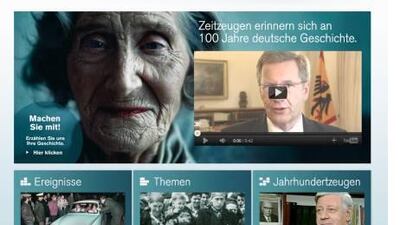BERLIN // Germany has begun compiling thousands of personal video accounts of the events that shaped its turbulent 20th century history as part of an ambitious project to construct an internet-based "memory of the nation" accessible to all.
The video testimonies will cover the period from the First World War to the present day.
Researchers will initially focus on gathering interviews about the Nazi era and the country's Cold War division and reunification.
The initiative, backed by Daimler, Google and German media companies, and endorsed by the government, was launched on October 6, when about 1,600 interviews from the archives of the public broadcaster, ZDF, were put online on the website www.gedaechtnis-der-nation.de.
One-hour interviews with 40 prominent figures, such as Helmut Kohl, the former chancellor, and Simon Wiesenthal, the Nazi hunter who died in 2005, have been posted.
A "century bus" containing a recording studio will tour Germany until early December to gather fresh testimonies from volunteers.
The project also offers people the chance to submit their own interviews with friends and relatives for a separate historical website run in cooperation with YouTube.
"History lives through memory. Keeping it alive is of great importance, especially in Germany," said Christian Wulff, the German president, in a video message posted on the site. "Nothing brings history to life for new generations as much as the recollections of contemporary witnesses."
The project was inspired by the Shoah Foundation, set up in 1994 by Steven Spielberg, the US filmmaker. The organisation has recorded statements by more than 50,000 Holocaust survivors.
The new interviews hope to gain testimony about the German resistance movement against Hitler, as there is scant documentary evidence in the form of diary records.
Attempts are also being made to find people willing to talk about how and why they supported the Nazi regime, although the project's organisers hold little hope that many people would come forward to discuss the subject.
So-called "oral history" has become increasingly popular worldwide in the past decade, driven by a desire to hear the Second World War generations recall the era before they die.
But the testimonies have also been feeding new research into how human memory changes over time. That aspect illustrates the shortcomings of oral history - it is chronically unreliable as recollections become distorted.
"People's memories should be very different because everyone has very different life experiences, but we have found that after 50 or 60 years, memories get canalised, and people basically tend to tell the same stories," said Professor Sönke Neitzel, a German historian at Glasgow University who heads a team of consultants for the project.
"One common statement is that, 'Until Stalingrad, everything was good and after Stalingrad everything was bad'," said Prof Neitzel, referring to the defeat in February 1943 of the German army in the crucial battle for the strategic city of Stalingrad in the Soviet Union. The loss was widely seen as a turning point in the war.
"But that statement cannot be true, because hundreds of thousands of people died before that and you already had persecution and Auschwitz.
"The way people arrive at a common interpretation of events is highly interesting for research."
Over the past decade, German public discourse about the Nazi era has started to address its own suffering, such as the aerial bombardment by the Allies, the expulsion of Germans from the eastern territories and the rapes committed by Soviet troops.
Prof Neitzel said there was not a risk that oral testimonies focusing on those aspects of the war and on the resistance against Hitler would obscure Germany's guilt.
"These sources have to be put into context and viewed critically like any other historical source," he said. "Making them accessible to the general public is a big opportunity. It used to be extremely difficult to get access to archives of recorded testimonies."
The online archive will also be a useful educational tool for schools, and the team behind the project aim to keep adding to the site over the coming years.
"It would be interesting to hear someone talking now about what life was like in East Germany and to interview them again on the same subject in 10 years to see how their reminiscences have changed," said Prof Neitzel. The oral history project follows the publication last month of a wartime diary that gained international attention because it highlighted how much ordinary Germans knew about the atrocities being committed during the Nazi regime.
Written by Friedrich Kellner, a court official in the small western town of Laubach who refused to join the Nazi party, the chronicle contains commentaries about events, newspaper cuttings and records of private conversations that show the mass shootings of Jews and the euthanasia of disabled children were not a secret. One entry, dated October 28, 1941, reads: "A soldier on holiday here said he witnessed a terrible atrocity in the occupied parts of Poland.
"He watched as naked Jewish men and women were placed in front of a long deep ditch and upon the order of the SS were shot by Ukrainians in the back of their heads and they fell into the ditch.
"Then the ditch was filled with dirt even as he could still hear screams coming from people still alive in the ditch."

